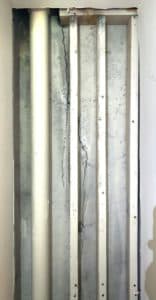
Originally posted 3/6/19, updated 6/25/21
When you hear “expansive soil,” what do you think? It’s soil that expands, right? What’s so bad about ‘expansive’ soil, compared to regular soil? One of them puts more strain on a home’s foundation.
Acculevel has been repairing foundations and waterproofing homes since 1996. Over the years, we’ve helped more than 30,000 homeowners in Indiana and the surrounding areas restore health and stability to their homes. We want to educate homeowners about the variables that can play a role in damaging your home, and how to recognize them.
In this article, we’ll explain how you can determine if you have expansive soil, when it’s an issue, and what symptoms to watch for.
Expansive soil is sometimes referred to as “expansive clay” or “heavable soil.” These are all terms for the same kind of soil, which contains a significant amount of clay. Not sure what type of soil you have? Let’s do a quick, unscientific test: start by digging up a spadeful of dirt from your yard. If it’s dry, add a little water. Can you shape the dirt like a ball like play-do? If so, you have expansive soil.
If not, you have granular soil. This doesn’t mean you don’t have anything to worry about, though. Granular soil is susceptible to erosion, because it doesn’t pack together when it gets wet. The grains of the soil are more easily separated by water, which means they can wash away.
Granular soil separates as it gets wet, allowing water to move through it easily. Clay-dominant soil does the opposite. It expands with water, absorbing it like a sponge might. But this expansion happens slowly, because it takes time for the water to permeate through all the layers of clay. The extended reaction time makes the expansion more dramatic and its effect more severe.
As the soil expands, it moves outward, creating pressure that pushes against the foundation of your home. Concrete doesn’t like being pushed around (it is not designed to be flexible), so sometimes it cracks. The cracks can allow water seep into your basement or crawl space.
 This photo was taken by an Acculevel project manager during a free estimate appointment. This interior crack wasn’t discovered until it began to leak water, getting the drywall and carpet wet.
This photo was taken by an Acculevel project manager during a free estimate appointment. This interior crack wasn’t discovered until it began to leak water, getting the drywall and carpet wet.
The reversal of soil expansion is also a problem. As the moisture evaporates, the clay in the soil slowly retracts, pulling itself tighter together. This means when the soil dries out, it can cause the ground to pull away from your foundation. A lack of soil around or under your home means less support for the foundation. This causes sinking or uneven settling, which threatens the stability of your foundation.
There are some steps you can take to offset the effects of expansive soil. Make sure the ground around your home is properly graded, so that rainwater moves naturally away from your foundation. You should also make certain that your guttering is cleared and properly installed; clogs can cause rainwater to pool closer to your home. And your downspouts should be set to drain at least 10 feet away from your foundation.
If you have expansive soil during a drought, or a long dry spell, watering your soil can help. However, this needs to be done very carefully. You want to add enough water to keep your soil in place, but not too much. Then you’re forcing the soil to expand, which is also bad for your foundation. Like Goldilocks, the amount of water you add needs to be just right.
The type of foundation repairs you need, depends on how the clay in your soil has behaved. You may need the cracks repaired with an epoxy fill, which we consider to be the best and most reliable method.
If the foundation begins to shift due to uneven settling, helical piers may be necessary to stabilize the foundation. You can learn more about signs of foundation settling here.
Do you need more information about foundation problems and repair methods? Refer to our Foundation Repair Guide. This is a free and detailed resource we developed for homeowners, addressing your concerns and responding to your questions.
If you need foundation repairs now, find a local and reputable foundation repair company. We recommend that you verify that they are insured and accredited by the Better Business Bureau.
Of course, if you live in Indiana or the surrounding areas, you can contact Acculevel. We have a 5 star customer service rating, offer free written estimates, and provide whole-home solutions to preserve your home’s health and restore stability to your foundation. You can reach us at 866-669-3349 or by filling out this contact form.
[DISPLAY_ULTIMATE_SOCIAL_ICONS]